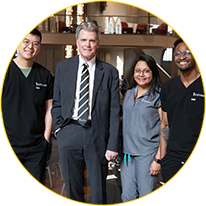 University of Maryland School of Dentistry student Sarah Ermoshkin, a Class of 2016 DDS candidate, participated in an externship, along with fellow student Sofia Hyuhn, with the Lummi Nation in Washington state, south of Vancouver, British Columbia. While there, she wrote an article about the challenges faced by rural communities as they seek health care providers and the experience of the Lummi Tribal Health Center in inviting dental students to help meet the community’s health needs.
University of Maryland School of Dentistry student Sarah Ermoshkin, a Class of 2016 DDS candidate, participated in an externship, along with fellow student Sofia Hyuhn, with the Lummi Nation in Washington state, south of Vancouver, British Columbia. While there, she wrote an article about the challenges faced by rural communities as they seek health care providers and the experience of the Lummi Tribal Health Center in inviting dental students to help meet the community’s health needs.
The article was published in the Lummi Tribe newspaper, Squol Quol. Ms. Ermoshkin provided the text, as well as a photograph that ran with the article.
Ms. Ermoshkin’s article, published under the headline “Lummi Nation Health Center Brings the Outside In,” follows:
By Sarah Ermoshkin
DDS Candidate Class of 2016
Dental students in their last year of dental training are invited to work with the Lummi Health Center where they can experience a community health clinic setting. The Lummi Tribal Health Center offers three-to four-week externship rotations with dental students from across the country, from Maryland to Kentucky from Texas to California, cumulatively providing over a thousand volunteer hours.
“Improving dental inequalities starts with oral health education in the community and is helped by increasing the dental work force in underserved areas. Inviting dental students to participate in community health centers like the Lummi Nation brings our community’s health care needs to the forefront,” said Dr. Ashyk.
Recent studies indicate that the most significant factors in encouraging graduates to locate in rural areas include a dental school’s commitment to rural curriculum and rotations in rural areas.

 “Similar results were found when UCLA/Drew Medical Education Program students participated in medical rotations in South Los Angeles, an impoverished urban area (Ko et al. 2007). Following the program, 53 percent were located in an impoverished or rural area after 10 years, compared with 26 percent of UCLA graduates, even after controlling for race and ethnicity.” (Rephann et all. 2011.)
“Similar results were found when UCLA/Drew Medical Education Program students participated in medical rotations in South Los Angeles, an impoverished urban area (Ko et al. 2007). Following the program, 53 percent were located in an impoverished or rural area after 10 years, compared with 26 percent of UCLA graduates, even after controlling for race and ethnicity.” (Rephann et all. 2011.)
Historically, dentists working in rural federally-qualified community health centers are in high demand and short supply. Almost half of rural community health centers have vacant dentist positions for over seven months (Doerscher et all. 2004). The Lummi Tribe’s approach to this problem is to increase opportunities for dental students interested in rural careers by providing hands-on experience.
Sometimes bringing students out here is all it takes. “I love it out here. I’m from Maryland and I would love to work with pediatric patients in the Lummi area. My top choice for a pediatric residency is now the program at the University of Washington.” says Sophia Huynh (UMB, Class 2016.)
The American Associations for Dental Research (AADR) estimate that the total global costs associated with dental diseases amounts to $442 billion per year, which calculates the direct costs (untreated tooth decay, severe periodontitis, and severe tooth loss) and indirect costs (absenteeism and productivity losses at work). Oral disease is more than an individual health concern— it’s a community burden and collectively a global issue.
Essentially, the solution involves a collaborative approach. Bringing dentists to rural areas is only one part of the solution. Another part of reducing the waiting list for care involves decreasing the number of “no shows” to the health clinic. Unfortunately, health clinics experience high rates of appointment failures. When this happens, it affects the entire pool of patients. For example, when a patient schedules three appointments by canceling or “no showing” the first two appointments and merely presents for the third appointment, this reduces the number of sessions available to others, expanding the wait time for an appointment across the community. “We are brainstorming incentives for our patients to stay committed to scheduled appointments to address this issue and we are open to any ideas from the community,” says Dr. Ash.
Another way Dr. Ash’s team has worked to address the shortage of practitioners includes bringing screening and sealants to the Lummi Nation School and offering clinic sessions on Saturdays. The clinic sends out permission forms that families can sign, so their children can be seen at school, offering convenience for tribal families. “From what we have been taught at dental school, preventing early childhood caries is an important step in improving life-long dental health and overall health,” says Sophia Huynh. After a quick Google search of hours of operation, the Lummi tribe appears to be the only dental clinic in the state of Washington open on Saturday for comprehensive care. “We are pursuing as many ‘out-of-the-box’ solutions as possible to bring timely service to our members,” says Dr. Dr. Ash, “Last April, we decided to open Saturdays for members who can’t take time off work for their routine care and emergencies. We appreciate our dentists, denturist, hygienist, and assistants who all strive to raise the bar every day:
- Dentists: Drs. Bixel, Dubek, Geigle, and Heather
- Denturist: Mr. Henriques
- Hygienist: Mrs. Ludjin
- Assistants: Siva, Tessa, and Crystal
Ultimately, by increasing patient education, making care more accessible through convenient and accessible appointments, reducing cancellations, and increasing professional interest in the community health clinic we will be able to increase the overall health services to each and every tribal member.



